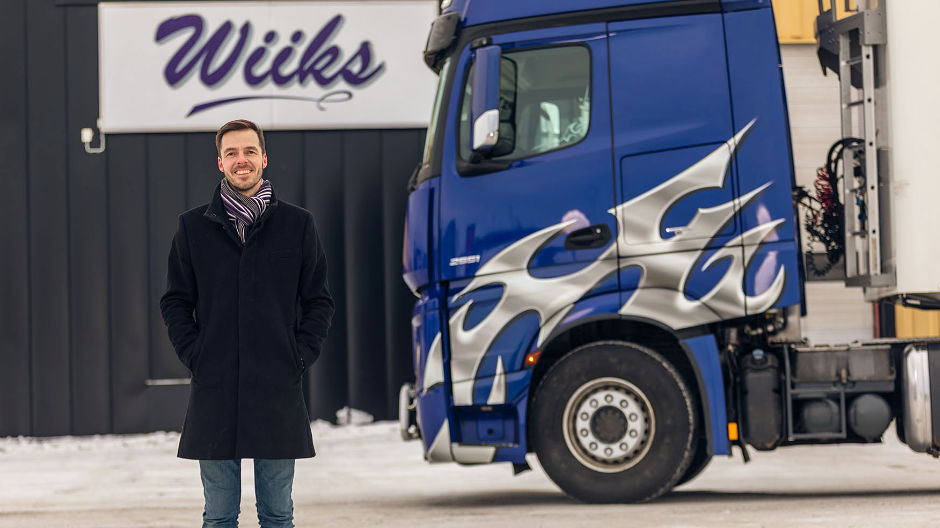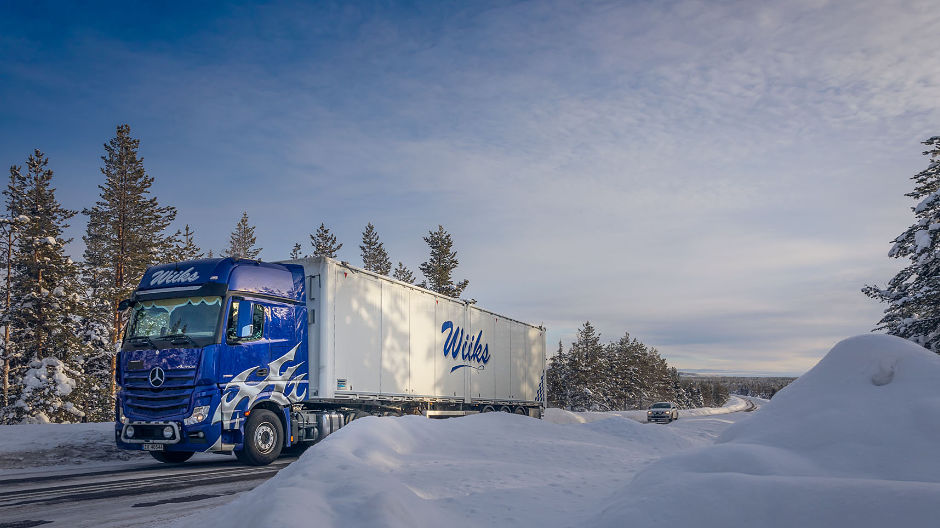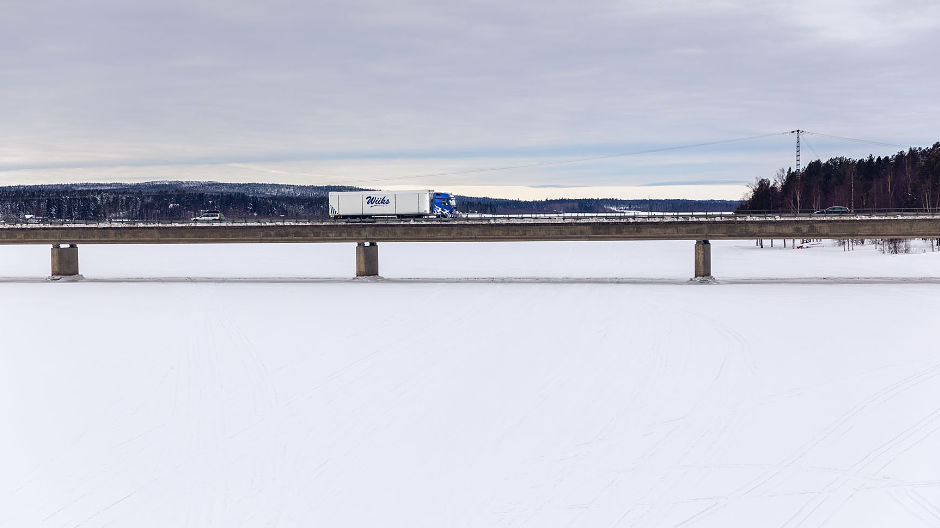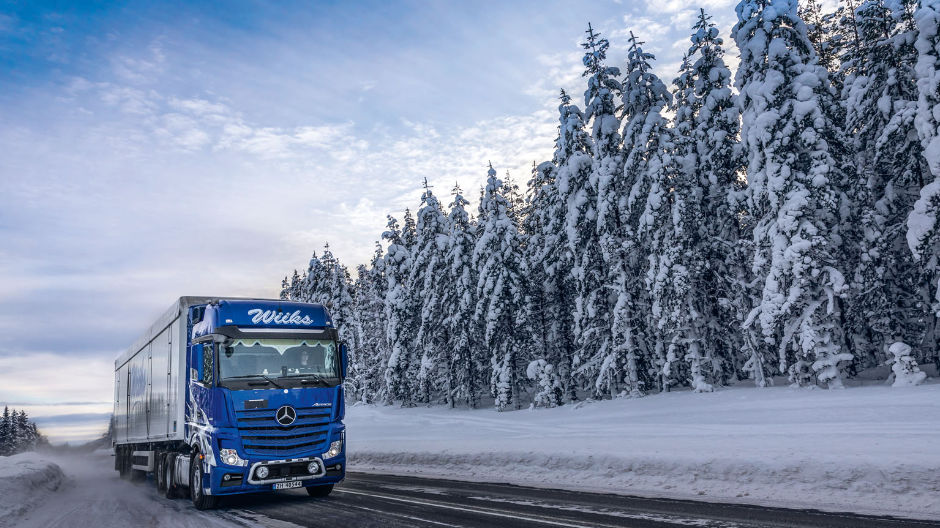
Sweden: Facing up to the winter – Wiiks Transport relies on the Actros
Business & Logistics
In the far North, the summers are short, and the distances vast. Wiiks Transport, based in Luleå in Swedish Lapland, specialises in shifting cargo to the most remote regions in Scandinavia. It’s a job for the Actros.
This article contains additional material (videos, images and reports etc.) for registered RoadStars members. In order to experience the article to the full, you need to log in with your RoadStars account or register for one free of charge.
Become a RoadStar and gain access to exclusive content and campaigns!
Login for RoadStars members
Not yet a member? Join RoadStars now
Obtain exclusive access to exciting events and activities which only RoadStars can offer.
Join RoadStarsExploring new territory is his game. Just under two years ago, Per Hedberg took over the logistics company Wiiks Transport, based in Luleå, Sweden. Previously the 39-year-old engineer had worked for many years in the steel manufacturing industry that dominates this region. “To move from there into logistics was a massive challenge, but this industry is exciting and very dynamic. I find that quite awesome.”
Wiiks Transport was established in 1974, and in 2017 the company generated around SEK 110 million (10.7 million euros) in sales revenues. The company specialises in cross-border transport runs in Scandinavia and operates an efficient network. 16 employees in Luleå and at the Norwegian branches in Tromsø and Bodø handle dispatch and customs clearance. Four mechanics keep the vehicle fleet shipshape at the company’s own workshop in Kalix, in northern Sweden. The fleet consists of a total of 24 trucks, with most of them towing sliding floor trailers. About 28 drivers, men and women, are on the move on the remote roads in the far North on behalf of Wiiks Transport. “We make a colourful bunch, with people coming from all the various regions in Scandinavia. There are even drivers from Germany who have joined us up here in the far North,” says Hedberg with a smile.

Per Hedberg, CEO of Wiiks Transport in Luleå.
Vast distances, very few people.
Scandinavia’s north is vast, and sparsely populated. The northernmost part of Sweden, Norrland, where Luleå is located, has a population of just 1.1 million inhabitants, on an area covering around 240 000 square kilometres. By comparison, the 242 000 square kilometres of the United Kingdom are home to more than 66 million people. “The distances up here are enormous,” says Per Hedberg. “That makes the trips our trucks are on mostly very long, and lonely. As there are only a few regional centres with major industries, which generally means small volumes of cargo, achieving full loads in order to make our operation profitable is therefore a complex task. We manage to meet this challenge thanks to our many years’ experience, and by cooperating with reliable partners.”
Among the biggest customers of Wiiks Transport are companies in the construction materials and furniture industries. Hedberg explains: “As well as conventional building materials, we currently also transport many wooden components for kitchens and furniture to Norway. For the return journey, we load our trucks with wood pellets or with recycled products that are used here in Sweden, for example, to generate energy.”




The weekly trips usually start out from Luleå. From here, Wiiks Transport distributes the freight to various destinations in Norway: from Mo i Rana via Bodø and Tromsø all the way north to Kirkenes, which is located just 10 kilometres away from the Russian border. Not all of the company’s customers are from Sweden. “In Luleå we also consolidate freight originating in southern Norway and in central Europe,” says Per Hedberg. “Because trucks can travel faster on the Swedish road network through lonely forests and lake landscapes than they would on Norway’s mountainous roads, the ‘detour’ through Norrland saves our customers valuable time.”


Hauling cargo under extreme conditions.
The trucks in the Wiiks Transport fleet cover about 3 000 kilometres a week – all year round. They do so in the very regions where almost all vehicle manufacturers go to test their new models under extreme conditions – because from October to April, winter conditions in northern Scandinavia are as harsh as they can get anywhere. It is especially during those times that driving through these deserted stretches is anything but routine. Permanently frozen ground with temperatures well below freezing and heavy rain can often turn roads into ice rinks. In the mountain regions there is often the added threat of avalanches.

41 degrees Celsius (minus) were measured in Luleå on 28 January 1999 – the lowest temperature recorded in the last 80 years.
“Nowadays you can only be competitive in the long term if you make your investment decision on the basis of robust, proven figures and performance data.”
– Per Hedberg, CEO of Wiiks Transport in Luleå
Despite the grim conditions, Emma Tornberg cannot imagine anything more enjoyable than being a trucker up here in the far North. “This is not a job, it is a real attitude to life,” says the 30-year-old. She has been driving a truck for over eight years now. Just under three years ago, she joined Wiiks Transport. “I grew up in a trucker family. My grandfather and my uncles ran a timber operation and drove long timber trucks themselves,” she says. For this Swede who hails from Kiruna, the Actros 2551 has since become her home away from home. “I get better sleep in my truck than I do in my bed at home. The truck’s comfort and handling are simply first-rate.”
Per Hedberg, too, has become a convert to the star in his fleet – especially when it comes to consumption and reliability. He loves juggling numbers and spreadsheets and analysing large amounts of data in search of fresh impetus for his business. “When we set out to buy trucks, as good Swedes we would of course have looked to the domestic brands in the past,” says the Managing Director.
“But nowadays you can only remain competitive in the long term if you go not only by your gut instinct, but also make your investment decisions on the basis of solid, proven figures and performance data. Looking at the overall economy, you simply cannot beat the trucks from Mercedes-Benz.”

Always on the road. Some 3 000 kilometres a week is the distance travelled by Wiiks Transport’s Actros 2551.
Fotos & video: Alexander Tempel




Comment
Please log in to post a comment.
13 comments
Kenne es von Kanada ( beutyfull British Columbia ). Wir fuhren Holz bis die Spannketten vor Kälte rissen.
Das ist kein Beruf sondern Berufung.
Wünsche Euch stets eine saubere Stoßstange.
Euer Kollege aus dem Schwabenländle
Dieter
Kenne es von Kanada ( beutyfull British Columbia ). Wir fuhren Holz bis die Spannketten vor Kälte rissen.
Das ist kein Beruf sondern Berufung.
Wünsche Euch stets eine saubere Stoßstange.
Euer Kollege aus dem Schwabenländle
Dieter